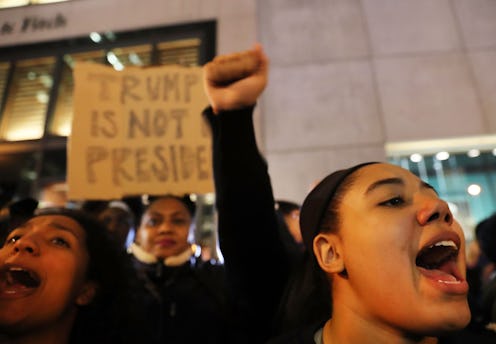News
Election Renews Calls To Ditch Electoral College
In the days since Donald Trump was named president-elect with 290 Electoral College votes, thousands of frustrated voters, in cities across the country, have taken to the streets with chants of "not my president." But there's more to protesters' rejection of Trump's election victory than simple voter disappointment. For the fifth time in U.S. history, the Electoral College has handed the presidency to the candidate who lost the popular vote. As a result, talk of circumventing the Electoral College is growing and legislation aimed at modifying how electoral votes are cast is drawing renewed interest.
Although Trump nabbed a majority of the electoral votes Tuesday night, numbers show he's losing the popular vote to Democratic nominee Hillary Clinton. With votes still being counted in a handful of left-leaning counties early Friday, Clinton led the popular vote with a nearly 400,000 vote margin, according to CBS News, CNN, and NBC News. In Los Angeles, New York, Chicago, Oakland, Boston, Seattle, Philadelphia, Atlanta, Dallas, Austin, Denver, Baltimore, and Portland thousands of demonstrators rejected Trump's election victory and called for ways to circumvent the Electoral College.
As unpopular as the Electoral College is — just a third of U.S. voters support the system, according to a Gallup poll in 2000 — we're unlikely to see it abolished altogether. Abolishing the Electoral College would require a Constitutional amendment, which necessitates approval from three-fourths of the states. But there's another movement already underfoot that aims to shift the balance of power in the Electoral College.
Under the Constitution, states are free to decide how their electoral votes are allocated, which means a state could theoretically opt to cast their electoral votes for the winner of the nationwide popular vote rather than the winner of the statewide vote. The group behind the National Popular Vote Interstate Compact is asking state legislatures to do just that on the grounds the Electoral College violates the principle that it's the will of the people that elects the president — a message even Trump has echoed.
The National Popular Vote bill is the legislative effort behind the National Popular Vote Interstate Compact that aims to guarantee the presidency to the winner of the nationwide popular vote. As of 2016, 10 states and the District of Columbia (pulling a combined 165 electoral votes) have adopted the legislation. However, the law can't take effect until it is enacted in states with a combined 105 electoral votes. While the bill has reportedly been passed by at least one chamber in 12 additional states (holding a combined 96 electoral votes) the measure has not yet picked up steam in states that typically lean red, as Nate Silver of FiveThirtyEight pointed out in 2014.
While the National Popular Vote Interstate Compact isn't new — it was drafted roughly 10 years ago — Trump's Electoral College win could stand to renew voter interest in the measure significantly. In the wake of the 2016 election, the group behind the National Popular Vote bill is urging supporters who live in states that have not yet passed the measure to reach out to their legislatures. Yet, while the results of this year's election may have renewed talk of nullifying or circumventing the Electoral College, the rules are unlikely to change before votes are cast in December.
